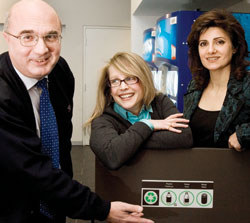Engineering the use of natural resources

Radu Zmeureanu, Guylaine Desmarais and Laleh Yerushalmi all teach the engineering faculty’s mandatory course on climate change and environmental stewardship.
Andrew Dobrowolskyj
Informing students of the role of sustainable development and environmental engineering in modern society isn’t enough for professor Laleh Yerushalmi. Encouraging them to turn theory into practice is her true ambition.
“We tell them what sustainable development means — to support economic growth and social progress without compromising or exhausting natural resources,” she said. “Why is it important to understand this concept? The problem is that climate and change [are products] of human activity.”
Discussing the causes and effects of global warming and climate change is the aim of Sustainable Development and Environmental Stewardship, a 200-level mandatory engineering course.
Yerushalmi teaches one of the sections of the course that is also taught by professors Radu Zmeureanu and Guylaine Desmarais. Each professor is charged with the task of instilling the importance of promoting sustainability and the environment in over 300 Engineering and Computer Science students registered in the course.
The course combines research from authoritative bodies like the Intergovernmental Panel on Climate Change, an evaluation of products, processes or technologies associated with the environment, and a technical perspective.
Yerushalmi’s concern for the defense of the environment was formed when she studied fermentation and other biological processes as a student. Coming from Iran to study chemical engineering at McGill in the early 1980s, she developed an interest in biochemistry and eventually biotechnology.
She came to Concordia last year after honing her teaching methods at McGill, where she also supervises graduate students evaluating greenhouse gas emissions. Her specialty, however, is water contamination and waste-water management, which led her to work with the National Research Council Canada.
“I’m very passionate about teaching. I connect with the students quite well,” she said. Though the course steers clear of political discussion and remains a technical engineering course, Yerushalmi feels her students are aware of major environmental concerns and the social and economic implications thereof.
“I think they know enough to get involved. They should translate it into action,” she said.
The three major course assignments take a good look at Canada’s commitment to Kyoto, developing and implementing alternative energy sources, and the daunting task of writing a portrait of environmental conditions in 2060.
The course also discusses the production and ramifications of pollution, greenhouse gases, deforestation, fossil fuel combustion and land-use change, among other issues. Educating students of the consequences of human and industrial activity on the environment is a matter of necessity for Yerushalmi.
“If we continue on as business as usual, we’re going to exhaust our natural resources,” she said, warning of disastrous outcomes. Arming engineering students with the capacity to develop and promote greener strategies is a step forward for a more sustainable future.
“I told them after the third week that ‘whether you want it or not, you have changed,’” she said. “Whatever you do, you cannot ignore the consequences of your actions.”